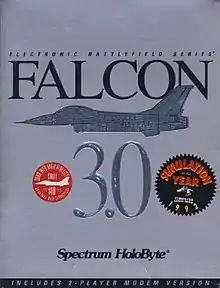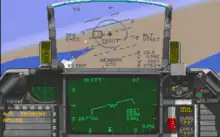| Falcon 3.0 | |
|---|---|
 | |
| Developer(s) | Sphere Inc. |
| Publisher(s) | |
| Director(s) | Scot Bayless |
| Designer(s) | Gilman Louie Les Watts |
| Programmer(s) | Erick Jap Kuswara Pranawahadi Gary Stottlemyer |
| Composer(s) | Paul Mogg |
| Series | Falcon |
| Platform(s) | MS-DOS |
| Release | 1991 |
| Genre(s) | Combat flight simulator |
| Mode(s) | Single player, multiplayer |
Falcon 3.0 is a combat flight simulator video game developed by Sphere Inc. and published by Spectrum HoloByte in 1991 as third official main entry in the Falcon series of the F-16 Fighting Falcon simulators.
Gameplay

Falcon 3.0 was claimed to have used flight dynamics from a real military simulator, and required a math coprocessor to enable the high fidelity flight mode. Even in less demanding modes, it was still virtually unplayable on computers slower than a 386. The recommended configuration was a 33 MHz 486, a top end machine at this time.
Falcon 3.0 offered "padlock" view, in which the player's POV is slewed in the direction of a selected target, scanning around the cockpit if necessary. It also offered players more natural looking topography than other commercial PC flight simulations at the time—with mountains, hills, valleys and other features having their own unique shapes.
Expansions
An expansion pack Operation Fighting Tiger was released in 1992. It contains several additional scenarios, including a future skirmish between Japan and Russia, which gave the player the Japanese F-16 variant, the "FSX".
Two more expansions were released in 1993: MiG-29: Deadly Adversary of Falcon 3.0 and Hornet: Naval Strike Fighter.
Art of the Kill, a video tutorial that teaches aerial dogfighting basics used Falcon 3.0's built-in ACMI recorder to reconstruct engagements, explains tactics and counter-tactics. Falcon 3.0 was also the subject of dozens of aftermarket books, some written by actual F-16 pilots. Only the Microsoft Flight Simulator series spawned more books.
The game was re-released in 1994 as Falcon Gold a compilation which included Art of the Kill video digitized on the CD collection, along with Operation Fighting Tiger and the announcement for Falcon 4.0. It noted for their early multiplayer support, as even the first version supported two players via a null modem serial port connection.
Reception
Falcon 3.0 sold 400,000 copies by March 1995.[1] Including its expansions, the full "Falcon 3.0 line" surpassed 700,000 copies in sales by December 1998.[2] According to GameSpot, Falcon 3.0 sold well for years after its initial release, and add-on products extended its longevity.[3]
Falcon 3.0 received 5 out of 5 stars in Dragon.[4] In 1992 a Vermont Air National Guard F-16 pilot stated in Computer Gaming World that the game's flight model and avionics were very accurate, and praised the game's VGA graphics.[5] A survey in the magazine that year of wargames with modern settings gave the game four and a half stars out of five, describing Falcon 3.0 as not as a game system as it is a way of life, but as the most complex air simulator ever released for the commercial sector,[6] and the magazine named it the year's best simulation game.[7] In 1996, the magazine ranked Falcon 3.0 as the tenth best computer game of all time for its introduction of "the first truly realistic flight model" for a jet aircraft, useful wingman and dynamic flight sim campaign,[8] as well as the seventh most innovative computer game for setting a standard for realism and connectivity.[9] That year, Falcon Gold was also ranked as the 80th top game of all time by Next Generation.[10]
In 1994, PC Gamer US named Falcon 3.0 the 15th best computer game ever. The editors wrote at the time that no other jet simulation could surpass Spectrum Holobyte's Falcon 3.0 for its realism and detailed flight models.[11] In 1996, Next Generation listed Falcon 3.0 Gold as number 80 on their "Top 100 Games of All Time".[12] CNET Gamecenter named Falcon 3.0 one of the 10 most innovative computer games ever.[13]
Despite many bugs (Computer Gaming World reported that "some readers have suggested that we give Falcon 3.0 the award for 'The Buggiest Game Ever'"), Falcon 3.0 retained its reputation as the most realistic flight simulation for years.
The editors of PCGames named Falcon 3.0 the best flight simulator of 1992, calling it the most detailed and most realistic simulator.[14]
Reviews
- Pelit - Feb, 1992[15]
- PC Joker - Feb, 1992
- Power Play - Jan, 1992[16]
- Computer Gaming World - Jun, 1992[17]
- Game Bytes - May 06, 1992[18]
- Play Time - Mar, 1992
- Score - Feb, 1994
- ASM (Aktueller Software Markt) - Mar, 1992
References
- ↑ Buchanan, Lee (March 1995). "The Falcon and the Sim Man". PC Gamer US. 2 (3): 124.
- ↑ "GAMECENTER.COM - Game News - Falcon: Then and Now". 12 October 1999. Archived from the original on 12 October 1999.
- ↑ GameSpot Staff (November 7, 2000). "The 15 Most Influential Games of All Time; Falcon 3.0". GameSpot. p. 7. Archived from the original on December 5, 2008. Retrieved August 16, 2019.
- ↑ Lesser, Hartley; Lesser, Patricia; Lesser, Kirk (December 1992). "The Role of Computers". Dragon (188): 57–64.
- ↑ Fick, Doug (April 1992). "Flight of the Falcon". Computer Gaming World. No. 93. p. 30-32. Retrieved 24 November 2013.
- ↑ Brooks, M. Evan (June 1992). "The Modern Games: 1950 - 2000". Computer Gaming World. p. 120. Retrieved 24 November 2013.
- ↑ "CGW Salutes The Games of the Year". Computer Gaming World. November 1992. p. 110. Retrieved 4 July 2014.
- ↑ "150 Best Games of All Time". Computer Gaming World. November 1996. pp. 64–80. Retrieved 25 March 2016.
- ↑ "The 15 Most Innovative Computer Games". Computer Gaming World. November 1996. p. 102. Retrieved 25 March 2016.
- ↑ Next Generation 21 (September 1996), p.64.
- ↑ Staff (August 1994). "PC Gamer Top 40: The Best Games of All Time". PC Gamer US (3): 32–42.
- ↑ "Top 100 Games of All Time". Next Generation. No. 21. Imagine Media. September 1996. p. 43.
- ↑ "GAMECENTER.COM - Features - The Hall of Game Innovation". 19 February 2001. Archived from the original on 19 February 2001.
- ↑ Keizer, Gregg; Yee, Bernie; Kawamoto, Wayne; Crotty, Cameron; Olafson, Peter; Brenesal, Barry (January 1993). "Best of PCGames '92". PCGames: 20–22, 24, 26, 28, 30, 32.
- ↑ "Falcon 3.0 – Bandiitti kello kuudessa". February 1992.
- ↑ "Kultpower.de - die Powerplay und ASM Fan Site".
- ↑ "CGW Museum - Galleries".
- ↑ "Game Bytes #1". 6 May 1992.